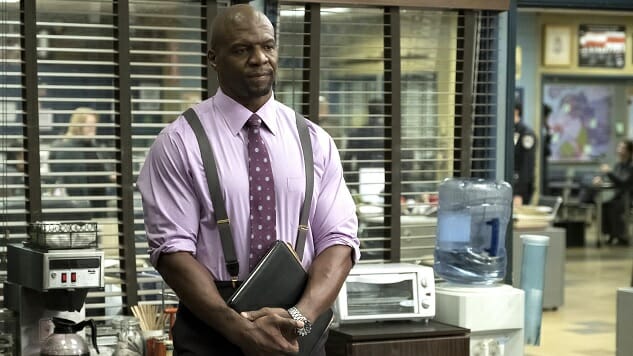Brooklyn Nine-Nine: “Moo Moo” Is One of the Best Episodes in the Series’ Canon
(Episode 4.16)
Fox
One minute, “Moo Moo” is about Sergeant Terry’s adorable elder children, Cagney and Lacey, placed temporarily in the custody of Brooklyn Nine-Nine’s adorable adult power couple, Jake and Amy, setting up a classic comedy scenario in which kids go wild while supervised by a pair of increasingly out-of-their-depth grown-ups. The next minute, it’s about the “deep-rooted institutionalized racism that remains pervasive in this country to this day.” (Source: Gina Linetti, of course.) Well played, Brooklyn Nine-Nine. Well played.
“Moo Moo” is the type of television that’s bound to piss off a not-insignificant percentage of its viewership, not because it’s bad, but because it’s real. Granted, I often stress in these recaps that Brooklyn Nine-Nine is not, and never quite has been, “that kind of show,” meaning that Dan Goor and Michael Schur didn’t conceive it for the purpose of addressing the social and political ills that plague American society even in 2017. It’s a workplace sitcom styled after series like The Office, in which an infantilized hotshot detective is forced to mature fast by the arrival of a new boss in his police precinct; very little actual police work is done from episode to episode, and what police work we see is often glossed over in favor of fleshing out relationships between characters. That’s the kind of show Brooklyn Nine-Nine is. That’s the kind of show we expect it to be.
That doesn’t change in “Moo Moo,” really, but “Moo Moo” is, perhaps, the fourth season’s best beneficiary to date of Brooklyn Nine-Nine’s longstanding character developments: Here, the amount of time we’ve spent investing in its cast pays off with astronomic results, even if there aren’t many belly laughs included in those results. Maybe the idea of reduced funny stuff in Brooklyn Nine-Nine is anathema to you. If so, “Moo Moo” won’t rate, but if so, well: How closely have you been watching the show, really? I can’t think of many times offhand where Brooklyn Nine-Nine has directly addressed systemic concerns of prejudice in law enforcement — “Old School” comes to mind, and flashbacks involving Madeleine Wuntch — but to depict anything is to comment on it, so one could argue that commentary has always been a part of Brooklyn Nine-Nine. Stealth commentary, perhaps, but commentary nonetheless.
Here’s the breakdown: Terry, seeking greater responsibility from Holt, tries out for a role as city council liaison, and calls on Jake and Amy to babysit Cagney and Lacey so he can put together the (outlandishly daunting) application for the position. Jake and Amy, being good sports, agree to help him out, but their endearingly lax babysitting style results in a possession lost: Moo Moo, Cagney’s blanky, which gets tossed out of the car window during a game of “Up/Down.” You can scarcely blame Jake and Amy for the oversight. Letting kids do whatever the hell they like when “whatever the hell they like” happens to be both cute and entertaining is a rookie mistake. We’ve all been there. The same can’t necessarily be said of the ugly situation Terry finds himself in later on, when he heads out to recover Moo Moo and ends up being targeted and harassed by a white cop on account of his blackness.
-

-

-

-

-

-

-

-

-

-

-

-

-

-

-

-

-

-

-

-

-

-

-

-

-

-

-

-

-

-

-

-

-

-

-

-

-

-

-

-








































